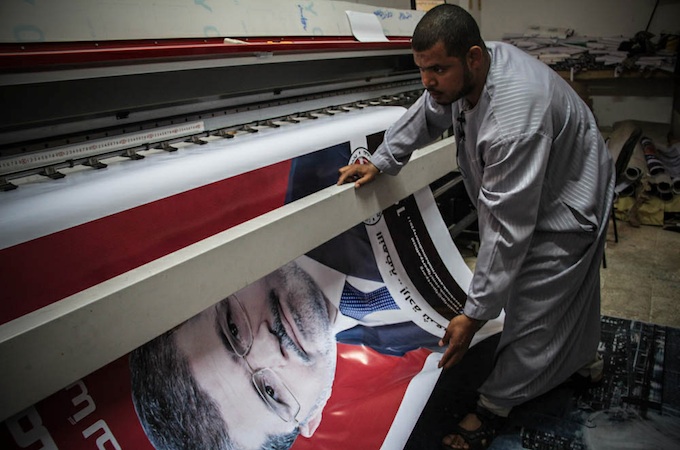Meet a Muslim Brotherhood member and revolutionary who's busy printing more than 5,000 metres of Morsi campaign posters.
Evan Hill Last Modified: 15 Jun 2012 22:46
|

Khalifa has been into printing for a few years and doesn't only print electoral banners [Mosa'ab Elshamy/Al Jazeera]
|
Sixth of October City, Egypt - Sitting in a tiny office at the back of his print shop, 33-year-old co-owner Mohammed Khalifa, wearing a blue galabeya clipped with his mobile phone’s earpiece, recalled the days when he and his fellow Muslim Brothers would press their local branch leaders about revolution. When would the time come to change the government, they wanted to know. “The answer always came with wisdom, along the lines of: ‘The Brothers should not revolt on their own, the people should be with the Brothers,’” he said. “In the words of the prophet, victory comes through patience.” On January 28, 2011 - the bloodiest day of the uprising - Khalifa and other men from his Brotherhood branch went to pray at the Istiqama Mosque in Giza. He told his father he intended to join the demonstrations but kept the news from his mother. The men took the streets immediately afterward, walking headlong into brutal clashes with the police. By the end of the day, they and thousands of other protesters had taken Tahrir Square. Now Khalifa prints banners for the Brotherhood’s presidential candidate, Mohammed Morsi, the group’s second-choice nominee but a man who many see as the last chance for their evaporating revolution to be saved from the country’s ruling generals and resurgent old regime. 'The way of the people'Since 1993, Khalifa has lived in suburban Sixth of October City. He and his wife, also a member of the Brotherhood, have three daughters. Khalifa and his business partner own one of a half dozen major print shops in the Giza governorate - the sprawling western expansion of Cairo proper.Since the presidential election season began, they have printed at least 5,000 metres of Morsi posters, each featuring the candidate’s bearded, bespectacled face and one of the campaign’s slogans, many touting the group’s “Renaissance” project for Egypt - “the way of the people”. Campaigns buy at a bulk rate of roughly 15 Egyptian pounds or $2.50 per metre, meaning Khalifa has pulled in around $12,500 from the Morsi campaign alone since late April. But the production isn’t cheap. The room-spanning My Jet printer and associated computer hardware required a more-than $33,000 investment, and the four varieties of ink he uses - cyan, magenta, yellow and black - run nearly $150 a week. Khalifa did some work for other campaigns - roughly 200 to 300 metres for moderate Islamist Abdel Moneim Aboul Fotouh, hardline conservative Salafi Hazem Abu Ismail and socialist Hamdeen Sabahi. For Morsi and Abu Ismail, many metres of work held the faces of the revolt’s martyrs, those protesters who have been killed since January 25, 2011. Though Khalifa does plenty of commercial work, he tries to uphold his and the Brotherhood’s principles. He refused to print for the rival campaign of former Prime Minister Ahmed Shafiq, who many see as the harbinger of the counter-revolution, and he also turned away the later-disqualified campaign of former intelligence chief Omar Suleiman when it reached out for work. In the spending habits of the campaigns, Khalifa saw the election trends play out. Morsi, who came in first with the Brotherhood’s machine behind him, spent the most on outdoor advertising, while Shafiq, who surprised many by coming in second despite his ties to the Mubarak regime, made a late spending spree that outpaced the other candidates. The two campaigns face off on Saturday and Sunday. A 'serious conspiracy'In Shafiq, Khalifa sees a “serious conspiracy” backed by the Supreme Council of the Armed Forces to undo the uprising that ousted Mubarak and saw many of his cadres imprisoned. But he said he was not going to lose hope. He still wants to see the Brotherhood unite with other political forces against Shafiq and other elements of the old regime.Khalifa’s stoicism is bolstered by his 20 years in the Brotherhood, which attracted him with its religious teachings and social work as much by its reputation for opposition to the crony capitalism of the Mubarak era. He was taught calligraphy by another Brother and drew banners with the Brotherhood’s rhetoric that they would hang clandestinely in the semi-darkness after performing dawn prayers. In those days, he and other members would find vacant or half-built apartments to use for painting cloth banners and making signs. There were always informers, and others were arrested and beaten. Before the 2005 parliamentary election, Khalifa and his friends escaped from residents who tried to arrest them for putting up banners opposing the government’s emergency laws. Five years later, before Mubarak's National Democratic Party swept more than 90 per cent of parliament, Khalifa and others spent days eating, sleeping and praying in a garage where they made political signs. “It is my belief that I must work and not necessarily get results from the work. This is what the Brothers taught us, and this is what Islam teaches us: work needs to be done,” he said. “If we do our part of the work, and the message reaches the people, that is enough of a reward ... If somebody stops us from reaching the people, we still get the reward from God, so in both situations, we aim for God’s reward.” |
memperkatakan mengenai jiwa kita yang merdeka supaya terus dan tetap merdeka :: dealing on the freedom of mind & soul so that they will be free forever
Monday, June 18, 2012
From protests to the print shop
Subscribe to:
Post Comments (Atom)
No comments:
Post a Comment